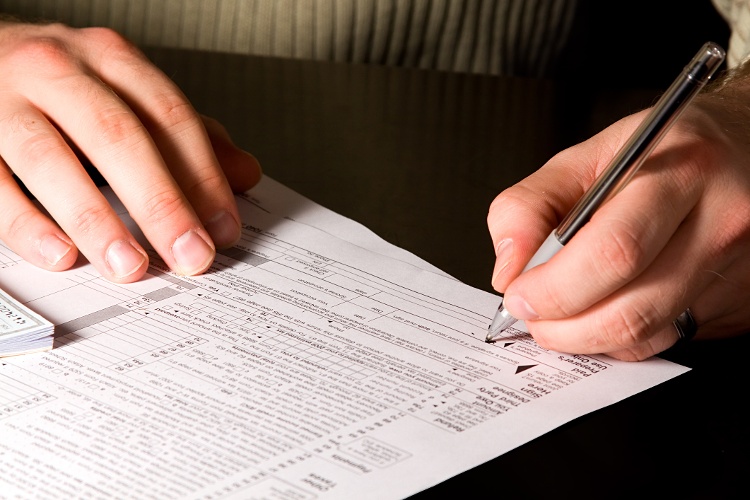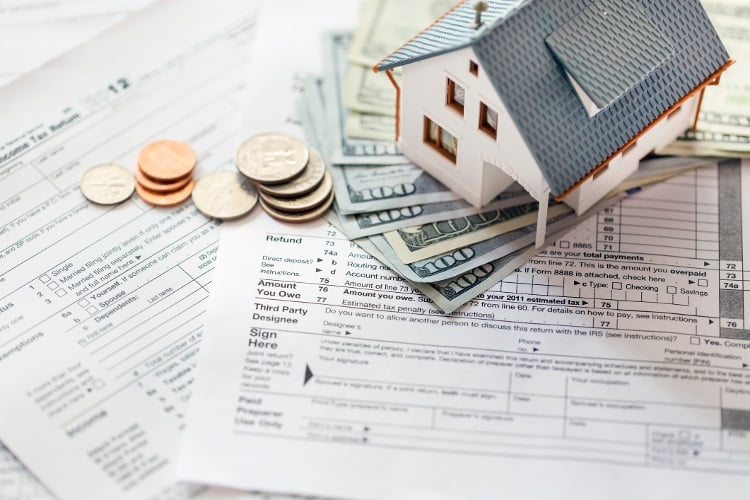As Benjamin Franklin said back in 1817, “In this world, nothing can be said to be certain, except death and taxes.”
While the part about death may be true, successful real estate investors today know that with so many rental property tax deductions available, paying taxes is far from certain.
Rental Income According to the IRS
Before we review the top rental property tax deductions you can take, let’s take a quick look at how the IRS defines rental income:
- Gross income you receive as rent
- Advance rent you receive, such as prepaid rent for future months
- Tenant application fees and lease termination fees (if allowed by local law)
- Services performed by the tenant in lieu of rent (such as painting) must be included in your rental income as if the tenant had paid the equivalent rent
- Lease with option-to-buy payments are generally treated entirely as rental income
Security deposits are a short-term liability if they are refundable based on the specific performance of the tenant, such as vacating the property in a clean and undamaged condition.
However, security deposits can be converted into rental income if:
- Security deposit is used as the final rent payment or advanced rent
- If part or all of the refundable security deposit is withheld and used by the landlord to pay for unpaid tenant rent or damages
A good accountant will tell you to report all of your income and expense as much as you can. Now that we know about income, we’ll review how to use rental property tax deductions to legally reduce your amount of taxable net income.

The Top 14 Rental Property Tax Deductions
Here’s a list of the top 14 rental property tax deductions you can take, including a few that many investors overlook:
1. Maintenance and repairs
The costs of materials and supplies, service fees for labor such as landscaping or equipment rental, and routine repairs such as broken windows or leaky pipes are fully tax-deductible the year that the expenses occur.
However, the IRS draws a red line between what a repair is and what a capital improvement is. In general, repairs that keep the property in habitable and good working condition are fully deductible the same tax year.
On the other hand, a capital improvement is something that adds value to your property or extends its useful life. Items such as a new HVAC system, roof replacement, and major renovations must be added to your rental property basis and then depreciated over 27.5 years.
2. Utilities
With single-family houses, tenants normally pay all of the utilities. But oftentimes with small multifamily property utilities such as water, sewer, and trash are ‘master metered’ and paid for by the landlord. You can deduct utility fees as rental property deductions, even if you pass through the charges as additional rent to the tenant.
3. Professional and legal fees
You can deduct fees paid to property managers, real estate brokers, leasing agents, attorneys, accountants, financial and tax advisors, and other professionals as long as the expenses relate to your rental property.
4. Independent contractors and employees
The wages you pay to W-2 employees (people that work directly for you on a salary or hourly wage) such as a full-time office administrator can be deducted as a business expense, as can the fees you pay to an independent contractor (1099 employee) such as a handyman.
5. Advertising costs
Depending on the agreement you have with your local property manager, you may be required to pay extra for advertising costs such as website advertising and yard signs. If you do, you can deduct advertising and marketing costs from your rental property income.
6. Commissions and referral fees
Commissions you pay a licensed real estate agent to find a new tenant or renew an existing lease, and “finder fees” you pay to existing tenants in a multifamily property to refer a new tenant to you can also be fully expensed as rental property tax deductions.

7. Personal property
Personal property such as appliances, landscaping equipment, or tools used on-site can normally be deducted over a five year period.
8. Interest payments
Mortgage interest, credit card interest for items purchased strictly for your rental property and HELOC (home equity line of credit) interest payments are fully deductible.
If you’re a landlord earning more than $25 million from your rental properties, the IRS limits the amount of interest deduction you can take. However, you can remove this limitation by agreeing to depreciate your rental property over a period of 30 years instead of the normal 27.5-year depreciation timeline for residential rental property.
9. Property tax
Property taxes levied by the local government (usually the county) and any use or occupancy taxes you pay are also rental property deductions. Normally a landlord or the property management company will pass through this tax to the tenant as a form of ‘additional rent’ and then record the occupancy tax payment as an expense on the property P&L (profit and loss) statement.
10. Insurance premiums
Annual premiums paid for different types of insurance such as landlord liability, theft, fire, and flood insurance are fully deductible. If you have W-2 employees (people that are on your payroll and that you withhold payroll tax on) you can also deduct the costs of health and workers’ compensation insurance.
11. Depreciation
The IRS depreciation expense allows you to deduct 3.636% of your residential property value (excluding the land value) each year up to 27.5 years. This is a non-cash deduction that allows you to reduce your amount of taxable net income, and possibly shift into a lower tax bracket creating even less taxable income.
12. Travel expenses
Travel expenses such as traveling to and from your rental property – including vehicle expenses, airfare, hotel, and meals – can be deducted from your rental income. However, be sure to keep records proving the expenses and document the purpose of each travel expense.
13. Home office space
The cost of dedicated space you use in your home for an office or as workspace can also be deducted as a rental property expense. You can make the deduction even if you rent where you live. The IRS has guidelines for a simplified option and a regular method to follow when making a home office deduction.
14. Pass-through tax deduction
Qualified business income - also known as QBI or the pass-through tax deduction – was established by the TCJA (Tax Cuts and Jobs Act) of 2008. QBI is actually an income tax deduction, not a rental property deduction. You’re allowed to deduct up to 20% of your net rental income or 2.5% of the initial cost of your property plus 25% of the amount you pay employees, depending on your level of personal income.
How to Report an Income Loss
One of the biggest benefits to investing in rental real estate is that you may be able to report a loss for tax purposes – usually by deducting the non-cash depreciation expense, even though your property is cash flow positive – while you still have a cash profit.
When this occurs, you have a “passive activity loss.” How you report an income loss depends on your total personal income and how actively involved you are with the property:
- Passive real estate investors, such as long-distance property owners who are not actively involved in leasing or managing the rental property, can only deduct passive losses up to the amount of passive income or gains. You can, however, carry forward unused losses to future tax years.
- Active real estate investors can deduct up to $25,000 in rental losses each year, although this deduction begins to phase out when your modified gross income (AGI) reaches and exceeds $100,000 per year.
- If you are a licensed real estate professional who spends more than 751 hours each year working in the real estate business, you can deduct all of your passive losses against your income. The same is true if your spouse actively works in real estate, even if you do not.
The Easy Way to Keep Records of Your Tax Deductions
The IRS requires you to keep records of your rental property tax deductions to document or prove the expenses are legitimate. Documentary evidence includes receipts, canceled checks or bills marked paid. If you’re audited and don’t have the backup for your expense deductions, the IRS may assess additional taxes, penalties, and interest for the tax that should have been paid.
A good way to keep track of the financial performance of each rental property you own is by using software such as Stessa.
Stessa helps streamline the record-keeping process so you can stay organized, maximize your tax deductions, and make informed decisions.
You also get features that make the day-to-day management of your properties easier, including:
- Automated income and expense tracking: Instantly sort and classify transactions from linked bank, lender, credit card, and property management accounts, all without additional fees or required add-ons.
- Financial reporting: Generate income statements, net cash flow summaries, and balance sheets (available with the paid Pro plan), among other reports.
- Landlord banking: Open an FDIC-insured high-yield bank account* for each property and easily integrate them with Stessa’s financial tracking features.
- Rental applications and tenant screening: Use Stessa’s tenant screening services and free rental applications to find and select qualified tenants.
- eSigning (in partnership with DocuSign): Upload your document, tag it for digital signatures, and send it to tenants, vendors, partners, and others.
- Free rent collection: Collect rent from tenants through one-time or recurring ACH payments.
- Real-time performance metrics: Get round-the-clock insights into the performance of your property portfolio.
- Property management integration: Link your property management data portal to Stessa to import transactions and get a detailed portfolio overview.
- Unlimited properties: Add an unlimited number of properties to your Stessa account.
- Collaborative access: Invite other investors, CPAs, spouses, and others to share your Stessa account. Manage their access levels to view and/or edit the account.
- Tax resources: Access the yearly Tax Guide and a suite of educational materials created in partnership with The Real Estate CPA to make tax season a breeze.
Experience a more efficient, stress-free way to manage your rental properties. Sign up for a free account with Stessa today.









